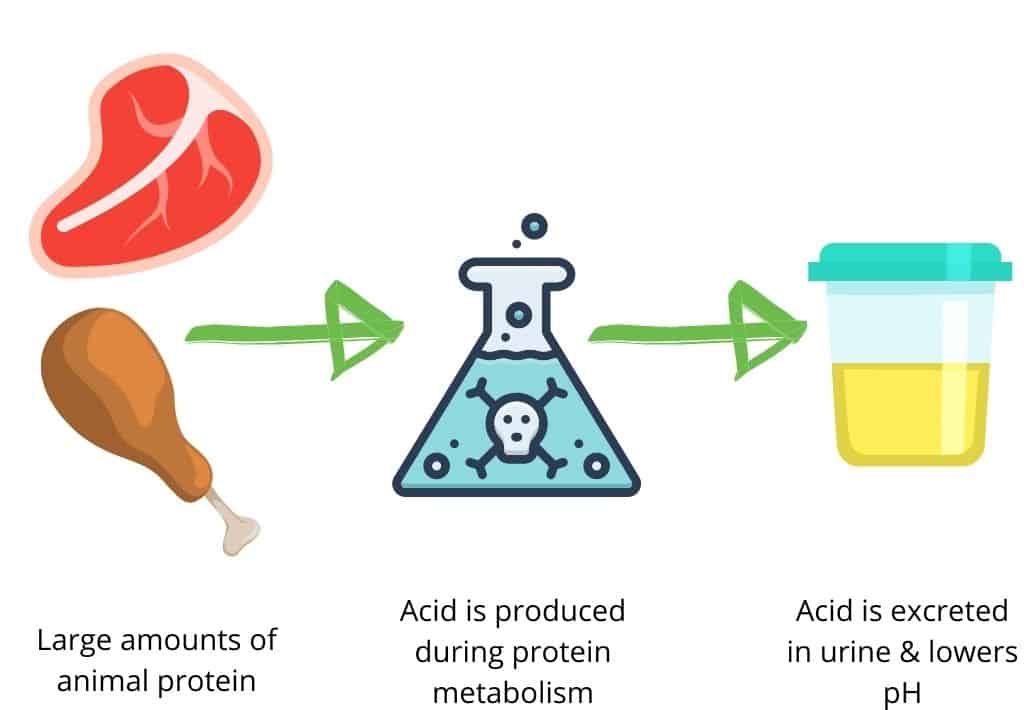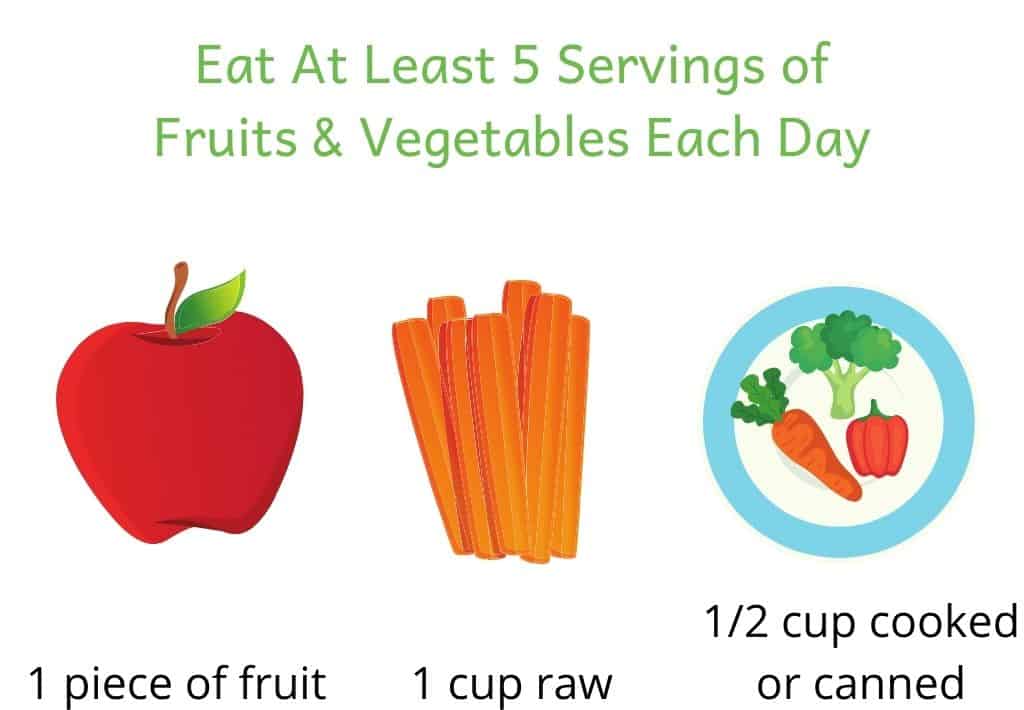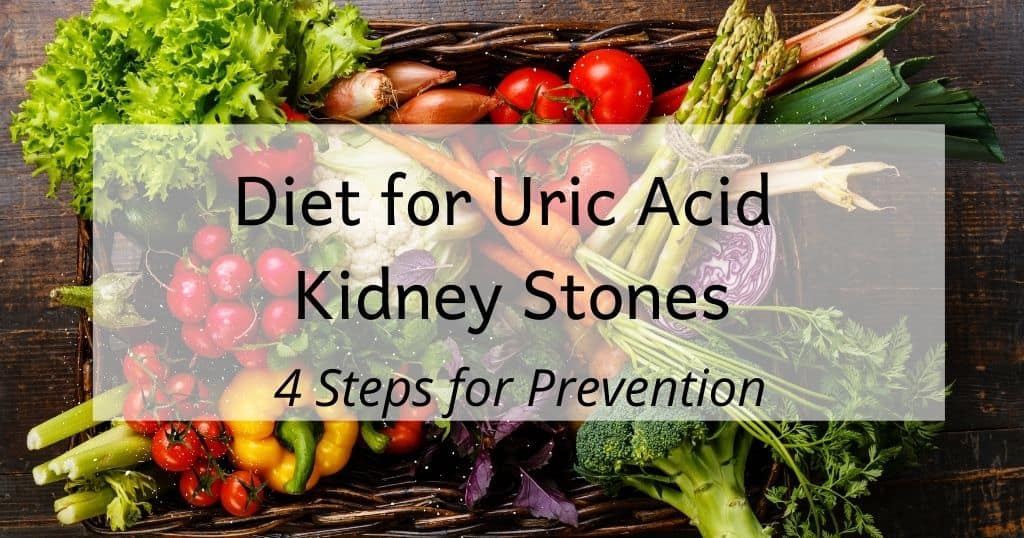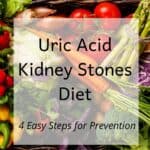There is no single kidney stone diet for everyone. Instead, nutrition for kidney stone prevention needs to be specialized to the kind of kidney stone you have. Read on to learn all about diet for uric acid kidney stone prevention.
Or, check out my post about nutrition for calcium oxalate kidney stones.
*Please note that this post contains clearly identified affiliate links. As an Amazon affiliate, I may earn a small commission on qualifying purchases (at no extra cost to you).
Table of Contents
Uric Acid Kidney Stones
Uric acid kidney stones make up about 10% of kidney stones in the United States. (1) Calcium oxalate kidney stones are the most common and make up about 75% of kidney stones. Kidney stones can also be made of calcium phosphate, struvite or cystine.
Causes of Uric Acid Kidney Stones
Low Urine pH
The main cause of uric acid kidney stones is urine that is too acidic. Uric acid becomes less soluble, and more likely to make a kidney stone, in acid. (2)
The amount of acid in your urine is measured by urine pH. Lower urine pH means that there is more acid in your urine. For kidney stone prevention, urine pH should be between approximately 5.8 and 6.2. A urine pH of less than 5.5 is a significant risk factor for uric acid kidney stones.(3)
Some of the most common causes of low urine pH are:
- Diabetes
- Metabolic syndrome
- Gout
- Excessive diarrhea
High Urine Uric Acid
High uric acid levels also contribute to uric acid kidney stones. High uric acid levels are characteristic of gout.
A 24-hour urine test will measure the amount of uric acid in your urine. Uric acid can also be measured by a simple blood test.
Uric Acid Kidney Stone Symptoms
The symptoms of uric acid kidney stones are the same as other types of kidney stones. The most common symptoms of kidney stones are:
- Pain in the lower back or groin
- Bloody urine
- Nausea or vomiting
- Fever or chills
How Do I Know If I Have Uric Acid Kidney Stones?
The only way to know for sure if you’ve had a uric acid kidney stone is to have your kidney stone analyzed. Don’t flush or throw away your kidney stone! Your doctor can send the kidney stone to a lab to get it analyzed.
If you were unable to catch your kidney stone, don’t fret! A 24-hour urine test can give you and your doctor a pretty good guess as to what kind of kidney stone you had. And, even better, the test can help you know what you can do to help prevent kidney stones from forming again. A 24 hour urine test is also a good option if you haven’t passed your kidney stone yet, but want to start to work on prevention!
Medical Treatment of Uric Acid Kidney Stones
The most common medical treatment for uric acid kidney stones are medications. Potassium citrate or sodium bicarbonate are commonly used to reduce acid in urine. (4)
Allopurinol is a common medication used to reduce uric acid and treat both gout and uric acid kidney stones.
4 Steps to Prevent Uric Acid Kidney Stones with Diet
In addition to medication, diet is an important part of uric acid kidney stone treatment.
Here are my 4 steps to the uric acid kidney stone diet.
Step 1: Drink Plenty of Water
Water is key to prevention of any type of kidney stone. Most people should drink enough to make 2 1/2 liters of urine each day. For most of us, this means drinking 3 liters (or, about 100 fluid ounces) of fluid each day. (5)
What Should I Drink?
Of course, water is best for kidney stone prevention. But, plain old water can get boring. Here are my favorite ways to mix it up:
- Unsweetened sparking water such as La Croix*, Spindrift*, Bubly* or Polar*
- Water infused with fruit and/or fresh herbs
- Unsweetened iced tea
- Hot coffee and tea (yes! 1-2 cups of coffee or tea per day is fine!)
- Sugar free lemonade and flavored drinks like Crystal Light*
On the flip side, there are some fluids you should stay away from with uric acid kidney stones. Enjoy these beverages in moderation:
- Regular soda
- Large amounts of juice
- Sweet tea
- Punch
- Lemonade made with sugar
- Energy drinks
Getting in this much water is no easy task! Many of my patients find it easier with the help of technology. A “smart” water bottle, such as the Hidrate Spark* can help you stay on track and meet your fluid goals.

Step 2: Smaller Portions of Animal Protein
Diets very high in animal protein increase risk of uric acid kidney stones. Our bodies make acid during the metabolism of animal protein. This acid gets excreted in our urine. So, the more animal protein you eat, the more acid is produced, and the more acid ends up in your urine.

Of course, you need to eat some protein! The key is eating the right amount of protein. You don’t necessarily need to go vegetarian and completely avoid meat. But, it is a good idea to keep portions of these foods to 3-6 ounces when you do eat them:
- Beef, pork and other meats
- Poultry
- Fish & Seafood
Ask your doctor or dietitian exactly how much protein is right for you!
Step 3: Eat More Produce
Whereas animal protein lowers urine pH, fruits and vegetables increase urine pH! Your body makes alkali (or, the opposite of acid) during the metabolism of fruits and vegetables. This alkali helps neutralize acid in your body.
Aim for at least 5 servings of fruits and vegetables each day. Any kind of fruit or vegetable will make alkali. Focus on a variety of fruits and vegetables. Enjoy whatever kind of vegetables and fruits you like!

Step 4: Limit Foods High in Purines
Purines are found in some foods and are metabolized to uric acid in our bodies. It is a good idea to limit foods high in purines as much as you can to prevent uric acid kidney stones.
- Red meat (beef, lamb, goat, etc.)
- Processed meats (bacon, sausage, lunchmeat, bologna, salami, etc.)
- Organ meats
- Seafood
- Beer and other alcohol
Dissolving Uric Acid Kidney Stones
Many people ask how to get rid of, or dissolve, kidney stones. Unfortunately, there is no food or herbal supplement that will dissolve or help get rid of kidney stones that have already formed. (Yes, even chanca piedra!). Medical treatment with large doses of alkali (usually in the form of potassium citrate or sodium bicarbonate) can help dissolve uric acid kidney stones.
But, these tips, along with a healthy lifestyle, can help prevent more kidney stones and stop kidney stones from growing.
Happy Eating!
Melanie



In one of your previous emails you talked about products such as Moonstone,Litholyte and Crystal light, as a source to get potasium citrate to help with prevention of kidney stones. I bought these products and include them in my daily water drinks, and so far have been very sucessful in preventing any stone symptoms.
Do you still recommend these products?
I think these can be wonderful products for people who need them! I’d have to see your 24-hour urine test and understand your current eating habits and medical history to know if they are right for you.
Hi Melanie, thank you so much for all your work. I’m in Australia and my results just came back from a 24 hour urine test for oxalates – 0.679 mmol which I think is high? But my urine PH was 1 which is very low? So good chance my stones are uric acid stones?
Hi Bess! I’d really have to look at your results as a whole to make any conclusions or recommendations!
First off, thanks for simplifying things. I’ve enjoyed your youtube videos. More so when I can actualy see you!
I’m in my mid-seventies and apparently my kidneys are as wrinkled as the rest of me. Got uric acid kidney stones last year.
The only one of your steps that hasn’t been easy to do is Step 3, eating more fruits and vegetables (5 servings).
I’ve never been able to eat a lot of fruit and vegetables without having gastrointestinal side effects.
And, getting old has only made that worse (the old fart syndrome). Ironically, I like the taste of fruit and veggies!
The potassium citrate pills also seem to cause a lot of bloating. But eating a lot of bread with them seems to help.
Keep up the good work young lady!
JimBo
I’m so glad you are enjoying my podcast! So sorry to hear that you developed uric acid kidney stones. I hope all of this helps. Every little bit you can do is so good!
Hi Melanie, I have high uric acid levels and low ph (5.0). How much sodium bicarbonate will help this and how is it taken? Thanks much.
Hi John! This is a question for your doctor. Medications are outside my scope of practice as a dietitian. However, nutrition can make a BIG difference for high uric acid and low pH. The goal is to eat a dietary pattern that produces less acid. You can learn more here!
Melanie,
My #1 issue is I had Crohns surgery 40+ years ago and can now eat a wonderful diet (low oxalate, protein, sodium) but have a larger food volume appetite than most.
Sodium numbers just sneak up on me due to volume.
Taking Potassium Citrate, Allopurinol, Chlorestyramine.
But after 8 I am always hungry.
Jay
Can you eat oxalate when you have uric acid stones? Also can you add baking soda to water and how much?
Thank you.
Hi Nancy! Nutrition for stones is completely dependent on your 24-hour urine test results. If your urine oxalate is low, there is absolutely no reason to avoid it!
Hi..my name is Theresa ..I’ve had high uric acid for more than 10 years my older I get the harder to pass them and more of them now…My two Urologist had my stones I saved analyzed, high purine and Uric acid..I have diabetes and high blood pressure..They gave me a three month prescription for potassium citrate, it a 1,000 or so mg it says, and they want me to take 2 two times a day to dissolve this one in my urethra now two weeks…won’t that raise my potassium and my sodium? isn’t this more dangerous for me?
Hi Theresa,
Great question! Most of us are actually getting NOWHERE near enough potassium and many people are on very high doses of potassium citrate and do perfectly fine. I’d have to know more about your medical history, labs and current eating habits to say what is ok or best for you!
I have Uric Acid stones. My urine pH is 5,5 or ore often 6.0. My blood Uric acid in mid normal at 4.9. I do love meat especially chicken. I worry about getting enough Ca so I usually drink 2% milk, and lots of water.
Hi Kayla! You can definitely still enjoy chicken and other meats. The key is just learning how much is right for you and eating them as part of a balanced diet. This is what I help people understand how to do in Kidney Stone Nutrition School if you want to check it out!
that’s 4 tablets a day…that’s a lot of potassium and sodium is that safe, but I cannot pass this one for some reason, it’s too large but I keep making 3 or more a month only in that left kidney…isn’t there something safer to do?
I have 80% Uric acid stones and 20% oxalate. I don’t know if I have wrong info or frequent diarrhea is causing more and more stones. I’m 80 yrs old and need guidance about eating the right thing because different sites for kidney stone diet contradict each other as to what one should eat. One will say don’t eat certain foods then another will say you should eat those foods.
Hi Sylvia! Thanks for your comment. Dehydration from frequent diarrhea could definitely contribute to kidney stones. You are certainly right in that lots of sites contradict each other. I think a BIG reason why this is, is that there isn’t one single “kidney stone diet”. Instead, healthy eating for kidney stones really needs to be individualized to the type of kidney stones you have and (more importantly), your 24 hour urine test results. Has your doctor given you any direction?
Hi Sally!
What is your take on cell salts to help with calcium in the body? I have graves disease and have had problems with dairy, gluten, grains, nuts and seeds. I have Osteopenia and bones feels super weaks. Doc recommends Fossamax for that but I am not sure I could handle the treatment.
Hello! Unfortunately, I don’t know of any research on cell salts, so cannot recommend them. I’d recommend trying what your doctor recommends and seeing how your body handles it.
I had uric acid stones that gave me complete kidney failure. I take potassium citrate for remnants that could not reach in the staghorn formation on my left side. I have IBS diabetes type 2 and thyroid issues. I struggle to lose weight. How much chicken should be eaten in a day or week?
The amount of chicken and protein that is right for you completely depends on your 24 hour urine test, other medical history and current eating habits. I’d love to help you understand what is right for YOU in Kidney Stone Nutrition School!
How much is that school?
It depends on the type of enrollment you choose. You can learn more about it here!
I have been doing Keto for several years but after having a large Uric Acid stone, I am having to revamp my diet considerably. I am also have Type2 Diabetes which I have mainly controlled with the Keto diet. I am very concerned as my blood sugar has already started to show an upward trend with the reintroduction of more fruits and vegetables. I eat gluten and sugar free. Also, are eggs considered a restricted protein source? This was a great article and very helpful! I made an appointment for the Dietician in my doctor’s office, but can’t get in for 2 months, so any help is appreciated!
Hi Sally! Thank you for your comment. So happy to hear that you’ve decided to go with a more balanced approach and will be working with a renal dietitian! I’d REALLY focus on non-starchy veggies (pretty much ALL of them except for potatoes, corn and peas!). Include carb (fruit, whole grains, starchy veggies) in small portions and make sure to add SOME protein with all meals. Eggs, nuts/seeds, fish/chicken and other plant proteins are great options for people with uric acid stones. Hope that helps!
It does!. Thank you!